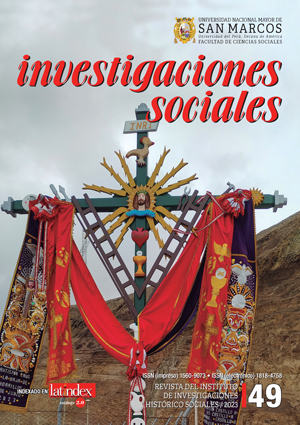Emerging effects and responses to the oil spill (La Pampilla Refinery 2022)
DOI:
https://doi.org/10.15381/is.n49.28154Keywords:
oil spill, effects, emerging responses, La Pampilla RefineryAbstract
The spill of 11,900 barrels of oil at La Pampilla refinery (Ventanilla, Callao) contaminated 98 sites (beaches, cliffs, points and other coastal formations) causing a wave of effects. The question arising is, what are the emerging effects and responses of the oil spill on the living conditions of the affected fishermen? The methodology was qualitative with a phenomenological-narrative design. Participant observation, semistructured interviews, and journalistic news gathering were used as research (and information gathering) techniques. Sampling was non-probabilistic, guided by observation (purposive sample). Interviews and observations were conducted in Ancon (docks) and Ventanilla under informed consent. The analysis was thematic (through inductive coding) of the interviews and observations in Nvivo software. As a result of the emerging themes, journalistic news and existing literature were compiled to triangulate the information. Among the results, 3 effects of the oil spill on the living conditions of artisanal fishermen were identified: i) contamination of the marine habitat and hydrobiological resources, ii) loss of jobs or unemployment, iii) health effects. On the other hand, 3 emerging responses were found: i) organizational strengthening, ii) emerging jobs, and iii) solidarity networks. It is concluded that in the face of the effects, complex and, to a certain degree, contradictory emerging responses emerge, which are unsustainable over time and fail to balance the current multidimensional affectation. Therefore, solutions and proposals are urgently needed at the institutional-political-legislative (by the Peruvian State) and business-economic (by the Repsol del Peru S.A.C. Group) levels that are sustainable over time, effective and multidimensional.
Downloads
Published
Issue
Section
License
Copyright (c) 2023 Jesús Cisneros Asca, Karla Solari Pérez, Kevin Llanos Flores, Gesebel Janeth Ortega Muñoz, Alvin David Sairitupac Jara, Melanie Danay Toro Cordero, Naysha Stephanie Lozada Quevedo, Alejandra Rosa Medina Córdova, Melissa Jessenia Ventura Ajahuana

This work is licensed under a Creative Commons Attribution 4.0 International License.
AUTHORS RETAIN THEIR RIGHTS:
a. Authors retain their trade mark rights and patent, and also on any process or procedure described in the article.
b. Authors retain their right to share, copy, distribute, perform and publicly communicate their article (eg, to place their article in an institutional repository or publish it in a book), with an acknowledgment of its initial publication in Investigaciones Sociales.
c. Authors retain theirs right to make a subsequent publication of their work, to use the article or any part thereof (eg a compilation of his papers, lecture notes, thesis, or a book), always indicating the source of publication (the originator of the work, journal, volume, number and date).













